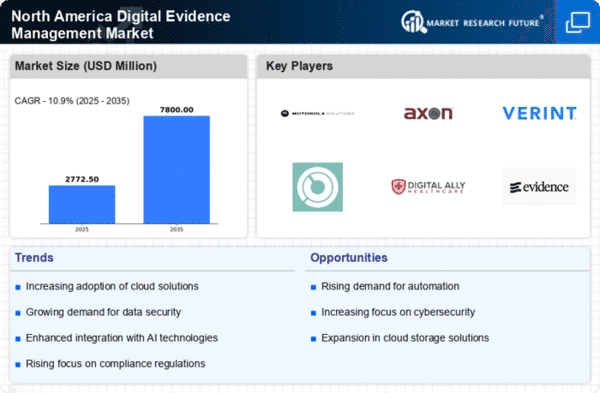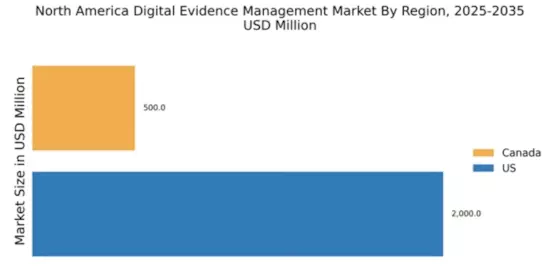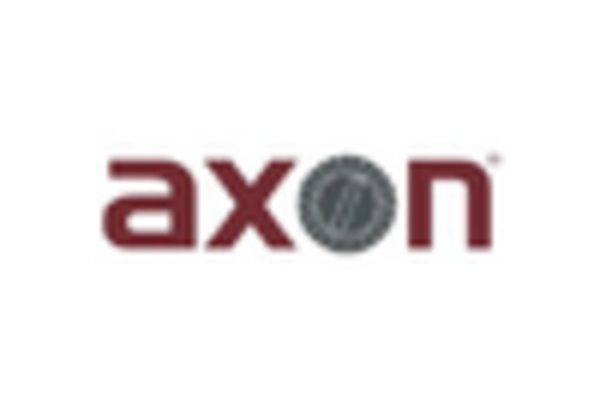Rising Demand for Digital Forensics
The increasing complexity of cybercrimes and digital fraud has led to a heightened demand for digital forensics within the digital evidence-management market. Law enforcement agencies and private organizations are investing in advanced tools to analyze digital evidence effectively. In 2025, the market for digital forensics is projected to reach approximately $5 billion in North America, reflecting a growth rate of around 15% annually. This surge is driven by the necessity for accurate evidence collection and analysis in legal proceedings, thereby enhancing the overall efficacy of the justice system. As the sophistication of cyber threats evolves, the digital evidence-management market must adapt to meet these challenges, ensuring that forensic capabilities are robust and reliable.
Advancements in Cloud Storage Solutions
The proliferation of cloud storage solutions has transformed the digital evidence-management market, particularly in North America. Organizations are increasingly utilizing cloud-based platforms to store and manage digital evidence securely. This shift not only enhances accessibility but also improves collaboration among law enforcement agencies. The cloud storage segment within the digital evidence-management market is anticipated to grow by 20% in the coming years, driven by the need for scalable and cost-effective solutions. As agencies seek to streamline their operations and reduce physical storage costs, the digital evidence-management market is likely to witness a significant transition towards cloud-based systems, which offer enhanced security and data integrity.
Integration of Advanced Analytics Tools
The integration of advanced analytics tools into the digital evidence-management market is reshaping how organizations process and analyze digital evidence. These tools enable law enforcement agencies to derive actionable insights from large volumes of data, enhancing investigative capabilities. The analytics segment is expected to grow by 25% in the next few years, driven by the increasing need for data-driven decision-making in criminal investigations. As agencies adopt these technologies, the digital evidence-management market is likely to experience a paradigm shift, where data analytics becomes a critical component of evidence management, ultimately improving case outcomes and operational efficiency.
Legislative Support for Digital Evidence
Legislation in North America increasingly supports the use of digital evidence in legal contexts, which significantly impacts the digital evidence-management market. Recent laws have established clearer guidelines for the admissibility of digital evidence in court, thereby encouraging law enforcement and legal professionals to adopt digital evidence-management solutions. This trend is expected to bolster market growth, with estimates suggesting a compound annual growth rate (CAGR) of 12% over the next five years. The legal framework surrounding digital evidence is evolving, and as it becomes more standardized, the digital evidence-management market is likely to see increased investment in technology and training to comply with these regulations.
Increased Focus on Training and Education
As the digital landscape evolves, there is a growing emphasis on training and education within the digital evidence-management market. Law enforcement agencies and legal professionals recognize the importance of understanding digital evidence handling and analysis. This focus on education is expected to drive market growth, with training programs projected to expand by 18% annually. Enhanced training initiatives not only improve the skills of personnel but also ensure compliance with best practices in evidence management. The digital evidence-management market is likely to benefit from this trend, as well-trained professionals are essential for maintaining the integrity and reliability of digital evidence in legal proceedings.

















